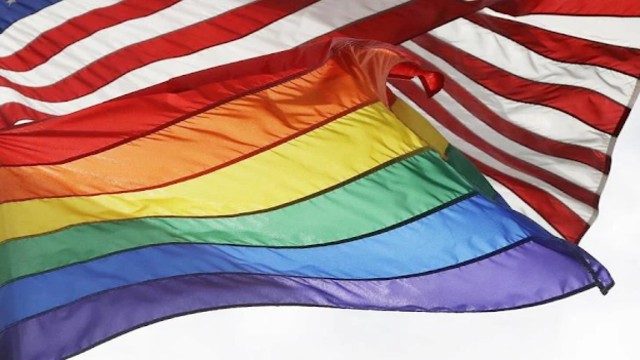
LGBTQ pride flag flying below the American flag on a flagpole. AP Photo
The Trump administration has abruptly canceled dozens of federal grants supporting research on LGBTQ health, drawing criticism from scientists and advocacy groups. The move affects studies on HIV prevention, cancer, mental health, and aging, potentially slowing medical advancements and leaving vulnerable communities without essential health insights.
Millions in Research Funding Slashed
At least 68 grants across 46 institutions were terminated last week, amounting to nearly $40 million in lost funding, according to government data. While some of the funds had already been used, at least $1.36 million in future support was withdrawn. Experts say this is likely an undercount, as funding details were unavailable for many projects.
The affected research largely focused on sexual minorities, including studies on HIV prevention, cancer risks, youth suicide, and bone health. The National Institutes of Health (NIH), which operates under the Department of Health and Human Services (HHS), issued the cancellations.
An HHS spokesperson, Andrew Nixon, defended the decision, stating that the agency aims to restore scientific integrity by eliminating “ideologically driven” research.
Vital LGBTQ Health Study Halted
One of the most significant losses is a project at Vanderbilt University, which had been tracking the health of over 1,200 LGBTQ adults over 50. The study, led by Tara McKay, had already produced two dozen published papers and contributed to training doctors to provide better care for LGBTQ patients.
McKay emphasized the impact of her research, which has helped increase cancer screenings and preventive healthcare for LGBTQ individuals.
"That saves money in healthcare and saves lives," she said.
However, since the grant was up for renewal in April, the termination means the research cannot continue, disrupting long-term findings.
No More LGBTQ Cancer Studies in the U.S.
The cuts also affected Simon Rosser, a researcher at the University of Minnesota studying cancer risks in gay and bisexual men.
"We now no longer have anywhere studying LGBT cancer in the United States," Rosser said.
He warned that canceling grants related to sexual minorities would slow scientific progress for everyone, not just LGBTQ individuals.
"Young researchers will lose their jobs, and the entire field will suffer," he added.
Backlash from the Scientific Community
Termination letters reviewed by the Associated Press cited reasons such as the research being “unscientific” or failing to “enhance the health of many Americans.”
For McKay, the wording felt personal and dismissive.
"My project was accused of having no benefit to the American people. But queer and trans folks are Americans too," she said.
The decision has sparked criticism from health professionals and advocacy groups, who argue that these cuts will widen health disparities and weaken public health efforts nationwide.















